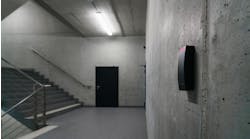- Do you need to worry about dew point if you’re using setback temperatures like 80 degrees F. cooling and 66 degrees F. heating in lieu of shutting down?
Maintaining dew point indoors at 62 degrees F. or less (and relative humidity below 65 percent) is always important for comfort and to reduce the possibility of mold. However, in my experience, the setback temperatures you mention are reasonable.
- Where can I get an itemized of items to check on my HVAC units?
Start with the manufacturer of your HVAC equipment. Also reference ASHRAE Standard 180 and speak with your HVAC contractor.
- What are your thoughts on the validity of duct cleaning?
A proper inspection will determine if HVAC cleaning (including the ductwork) is warranted. Ideally, the inspection should be conducted by a qualified and experienced third party that doesn’t offer cleaning services. Dirty HVAC systems can decrease operating efficiency and can adversely affect IAQ. If cleaning is warranted, it should be performed by a reputable firm that has NADCA-certified personnel onsite.
- What problems would a dirty chilled water loop cause?
Dirt and debris in a chilled water system can cause a number of issues, such as clogged strainers and control valves that don’t properly function. Reduced water flow decreases the total capacity and latent capacity of the system. These conditions can result in increased thermal comfort complaints, poor humidity control, odors, mold and mildew, and overall poor performance.
- Have you seen a known dirty cooling coil become clean using a UV lamp installation? Even between fins?
No. Dirty cooling coils should be properly cleaned to remove debris.
- We have budgeted for replacement of two air-conditioning systems this year. Can you offer any suggestions on what we should be looking for?
First, make sure the systems you choose fit the capacity of the space. Keep in mind that internal and external heat loads can change over the life of a building. For instance, more efficient lighting and window tinting/shades can significantly reduce heat gain and affect the size requirements. Also keep in mind that batt-type insulation above drop ceilings is often displaced by maintenance and other activities. While it’s important to consider the SEER/EER of HVAC equipment, keep in mind that existing building conditions play a big role in comfort and operational costs. Prior to changing out the system, consider conducting a building survey that includes a heat load analysis.
- If we can only do one thing in terms of HVAC maintenance, what should it be?
Hire a qualified and reputable HVAC contractor to conduct proper maintenance.
- How involved can my staff get in HVAC maintenance before I need to call in a third party?
This depends upon the knowledge and experience of your staff. Filter changes are often performed by staff, but even this task requires basic training. Consult with your HVAC contractor regarding your maintenance needs.
- What is the absolute longest you’ve seen an HVAC system last?
I’ve seen some pretty old systems out there, but anything more than 30 years old is pretty old, and is likely on its last legs.
- How do ENERGY STAR ratings play into HVAC maintenance?
Maintaining HVAC performance requires proper maintenance. ENERGY STAR offers good tips on its website: www.energystar.gov/index.cfm?c=heat_cool.pr_maintenance.
Voice your opinion!
Voice your opinion!
To join the conversation, and become an exclusive member of Buildings, create an account today!
Sponsored Recommendations
Sponsored Recommendations
Latest from Home
Latest from Home
Sponsored
Sponsored

